Arctic Initiative Highlights from Arctic Encounter Symposium 2024
From climate science to healthcare to waste management, read on for key takeaways from our team’s activities at Arctic Encounter Symposium 2024 in Anchorage, Alaska.
From climate science to healthcare to waste management, read on for key takeaways from our team’s activities at Arctic Encounter Symposium 2024 in Anchorage, Alaska.
Our team just returned from three days at the Arctic Encounter Symposium (AES) in Anchorage, Alaska. It was invigorating to take part in conversations about pressing Arctic issues, draw connections between local global challenges and opportunities, and to facilitate engagement between researchers and practitioners in service of mending the cracks emerging in Arctic governance. From climate science to healthcare to waste management, read on for key takeaways from our team’s activities at AES.
Jennifer Spence
Project Director, Arctic Initiative
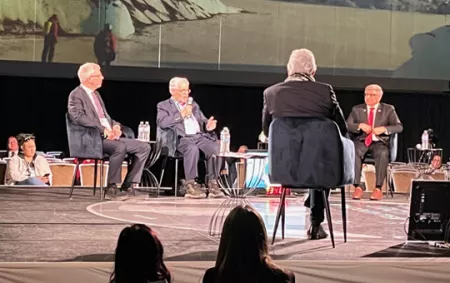
From permafrost thaw to wildfires, various feedback mechanisms are accelerating climate change in the Arctic, yet uncertainties about these phenomena hinder our ability to anticipate the most likely trajectories for global warming - and to develop appropriate adaptation and mitigation responses at all levels of government.
In a plenary session, John Holdren identified several key priorities for research and development to address the challenges of rapid Arctic climate change:
International collaboration is essential in all of this work, but Holdren noted that tension between Russia and the West over Russia’s invasion of Ukraine has stalled Arctic science cooperation. However, without Russia, which represents more than half of the Arctic Ocean’s coastline, getting a full picture of Arctic warming and its impacts on the region and the global climate is impossible.
Over the coming year, climate science cooperation will continue to be a priority for the Arctic Initiative. Last month, we issued a policy brief with recommendations for reinvigorating climate science cooperation through the Arctic Council. Our team is also committed to helping identify the most urgent knowledge gaps and Arctic research priorities for the next decade through the ICARP IV research planning process, which we helped kick off at Arctic Science Summit Week in early April.
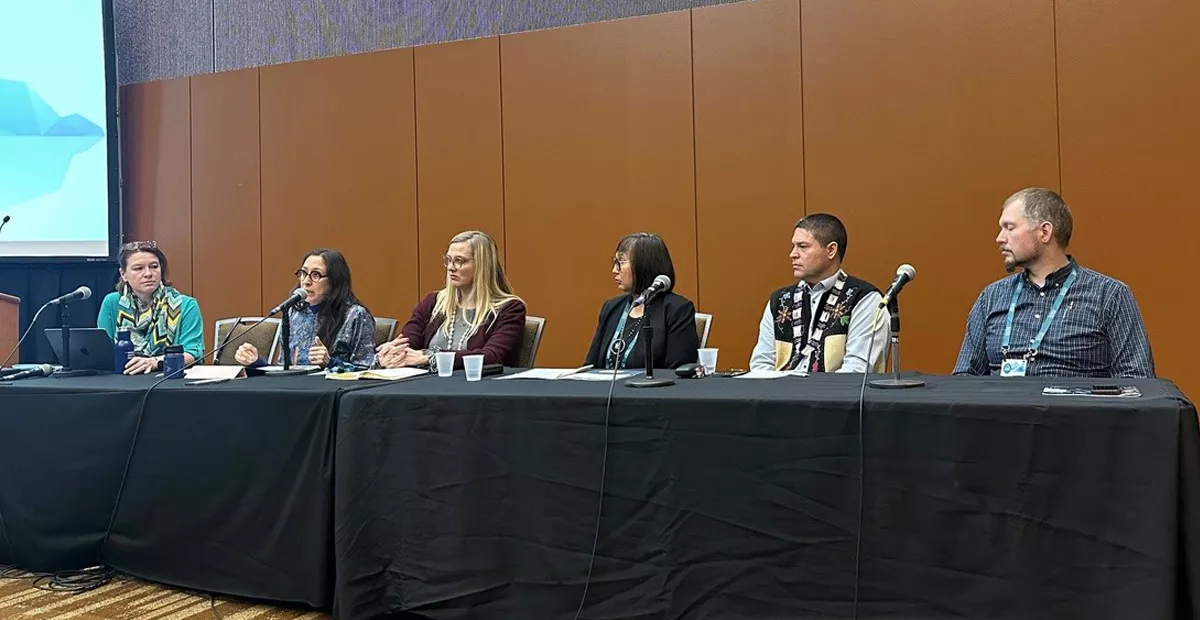
Arctic communities face a multitude of complex health challenges, from inadequate access to health services and sanitation infrastructure deficits, to food insecurity and behavioral and mental health challenges amplified by COVID-19. Climate change, too, presents new health threats that have not been fully assessed.
During a panel session organized by the Arctic Initiative and Arctic Mayors’ Forum, Jennifer Spence moderated a conversation with U.S. Arctic Research Commissioners, mayors, and community leaders, all of whom play a role in ensuring the delivery of essential health services to Arctic residents.
[On the lack of maternal healthcare services] "When I was pregnant, there was no midwife in my hometown. Maybe 30 years ago, we had a hospital and you could have a baby there, but not anymore. So you have to travel…for four weeks prior to your birth and stay somewhere…If you have complications, like I had, a high risk pregnancy, this is really difficult for ladies in the Arctic. And of course, when you face a reality like that, you want to leave the community." — Ásthildur Sturludóttir, Mayor of Akureyri, Iceland
[On telehealth] "[During COVID], one of the things that was unique is we saw the emergence of telehealth, teledoc options, where you could sit down with specialists from across the state of Alaska, from across the United States…We learned a lot in that period of time about how we can provide a high level of service to many of our rural areas…However, what I've experienced over the last few years is that there's been a significant rolling back of some of those telehealth options." — Bryce Ward, Mayor of Fairbanks North Star Borough
Panelists shared personal experiences that illustrated the range and complexity of the challenges facing Arctic communities. The session underscored both the need for a holistic view of health and wellbeing, encompassing not only factors like freedom from illness and access to health services, sanitation, and housing, but also access to traditional foods and the ability to practice cultural traditions and pass on one’s traditional knowledge and language.
[On the impacts of salmon fishing closures] "There’s all this [traditional Indigenous] knowledge that's not being passed on. I think about our younger generation a lot and how they hunger for that knowledge, what it does to their mental health, because they know something is missing." — Deborah Vo, U.S. Arctic Research Commission
[On the importance of gathering with family] "[My ts’ookal’s (grandmother’s) kitchen table] was the place where we gathered as a family, with friends, and celebrated each other and shared food…It was also where she was an artist and an activist. She did her beading at the kitchen table. She wrote a book in longhand on yellow legal pad. It was where she gathered with my grandfather and some of their very close friends and dared to dream big and think about change." — Nikoosh Carlo, U.S. Arctic Research Commission
A silver lining of all this complexity? There are more policy levers and innovation opportunities for improving peoples’ well-being than traditionally thought.
To learn more about the Arctic Initiative’s ongoing health research, check out Dr. Stuart Harris’ policy brief on how rapid warming is exacerbating pre-existing health inequities and introducing novel health risks among Arctic residents.
[On health as a prerequisite] "Our health and wellbeing are central to us being able to address all our other issues. Because when we're grounded and healthy, even on an individual level, we're more effective in the work that we're doing to care for others around us, to care for our community, and to advocate and be responsible people. " — Evon Peter, Center for Alaska Native Health Research, University of Alaska Fairbanks
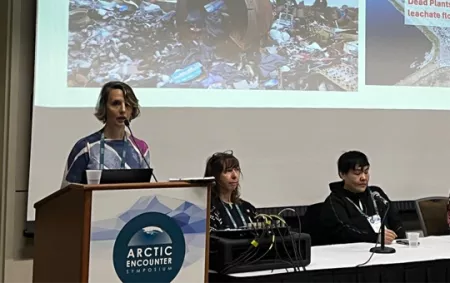
Solid waste management is an unglamorous but life-preserving service, and one that’s hard and getting harder to provide in rural Alaska. Here are some quick facts from Nadezhda Filimonova’s panel session (with nonprofit Zender Environmental Health and Research Group) on the topic:
Read Alaska News Source's coverage of the session: 'Toxic soup': Experts break down waste management struggles faced by rural communities
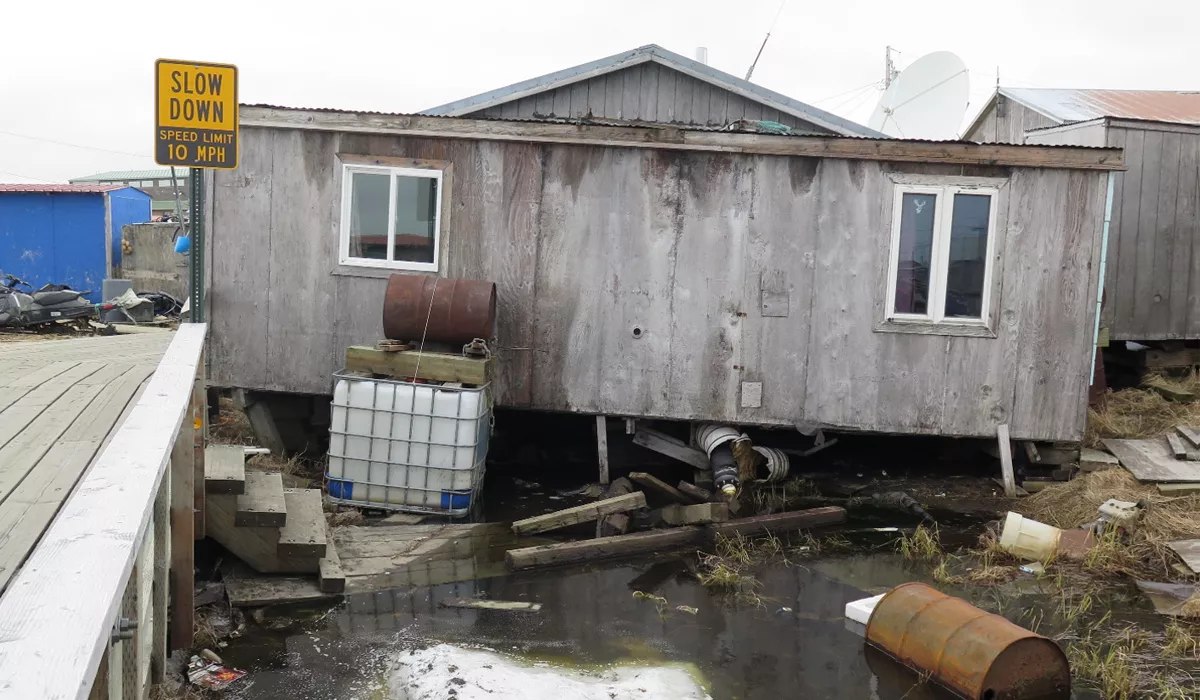
Communities throughout Alaska are being forced to make extremely difficult decisions about where and how they can live in order to protect themselves from climate-induced hazards caused by permafrost thaw. These impacts are projected to worsen and become more widespread as the world approaches 2°C of warming.
During a session organized by Permafrost Pathways, experts from the Arctic Initiative, Woodwell Climate Research Center, Alaska Native Tribal Health Consortium, the Arctic Athabaskan Council, and the Arctic Council shared insights into the effects of permafrost thaw on Arctic communities and ecosystems, community-led adaptation efforts in Alaska, and implications for the global climate system. Key takeaways include:
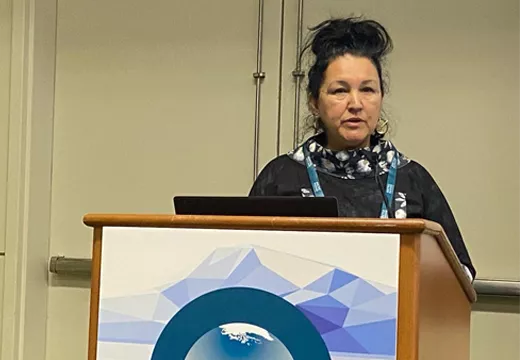
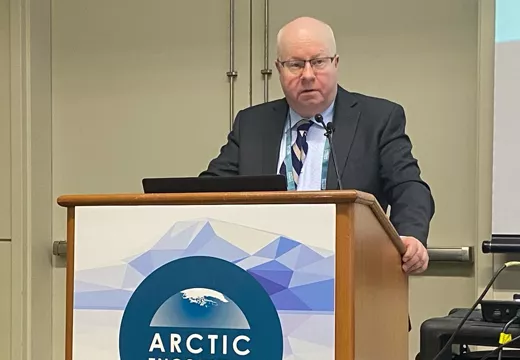
Hanlon, Elizabeth and Tessa Varvares. “Arctic Initiative Highlights from Arctic Encounter Symposium 2024.” Belfer Center for Science and International Affairs, Harvard Kennedy School, April 17, 2024